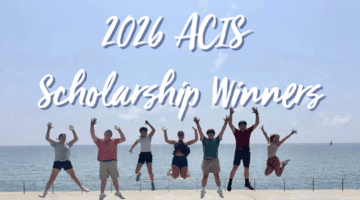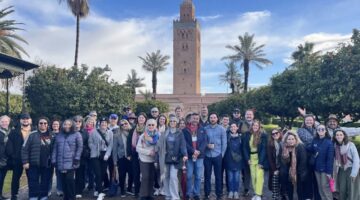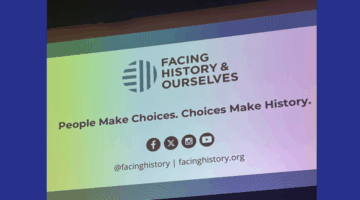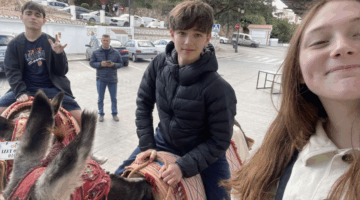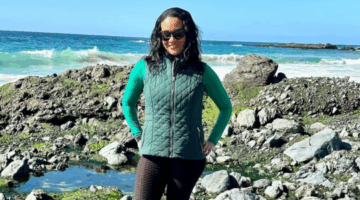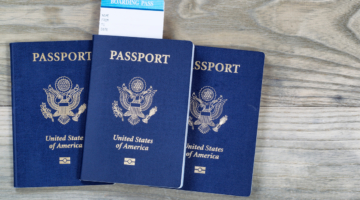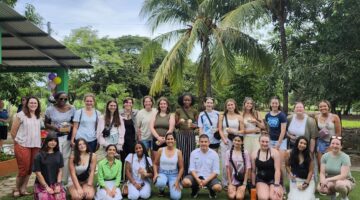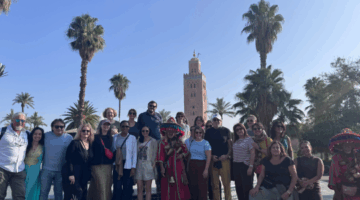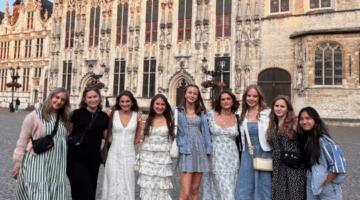ACIS is Partnering With Sophie Talks Science: Meet Sophie!
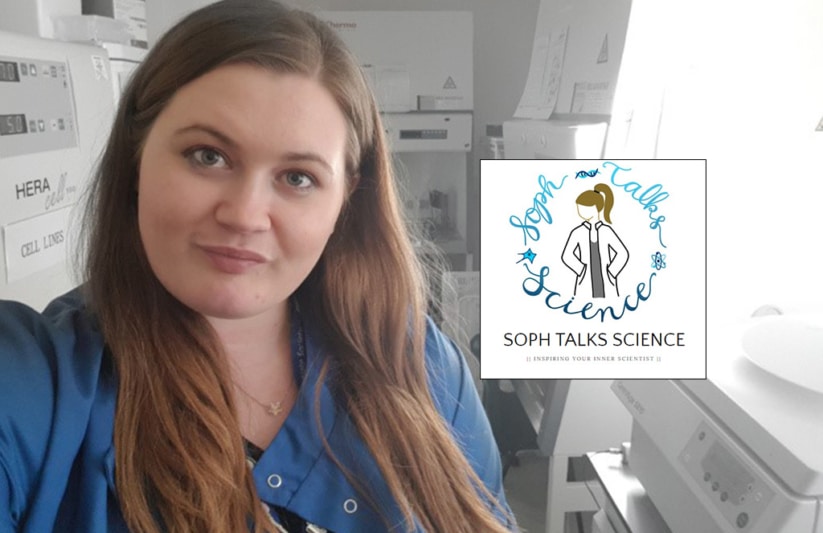
ACIS is teaming up with UK-based writer and scientist Sophie Arthur, author of the award-winning blog Soph Talks Science, for a unique partnership. Over the coming months, Sophie will be helping to enhance our STEM itineraries, using her experience to make them as relevant and rich as possible for teachers and students.
She has had a fascinating career journey, balancing her love of writing and travel with her passion for scientific inquiry, and we wanted to kick off our partnership introducing you to her!
1. Thanks for chatting with us, Sophie! Could you tell everyone a little bit about yourself?
Hi everyone! I’m Soph. I am a stem-cell biologist turned science communicator, and also an award-winning science and education blogger from the UK. I have just graduated from my PhD studying stem cells, but now I work at the London Institute of Medical Sciences getting to share the world-class research of my colleagues through loads of creative ways – by writing articles, social media posts, videos, comic books and more.
2. Tell us more about the world of sci communication. What is an average day like? What kind of skills did you need to have to go into that field?
Science communication or scicomm is a hugely varied world. Not everyone who calls themselves a science communicator will have the same roles in their job or same passions and skills for sharing science. Some may write about science, some will host TV shows, some will use social media and so on. But even doing the science communication for an institute like I do is hugely varied. Not only do I have the responsibility of sharing the scientific research that goes on, but I also have more general communications and marketing responsibilities too.
There is no average day. The only thing that is most common is sitting at my desk looking at my computer screen. But in that time I could be event organizing, planning social media content, writing a news article or putting together our latest newsletter and everything in-between. I’ve learned so many new skills since I’ve started, but I did have a good foundation of skills from side-hustles that got me the job in the first place. I had planned events, done a scicomm and digital marketing internship, written a blog and articles and knew how to use social media.
I think the great thing about science communication, though, is that there will be a role out there that suits your skills, and even if there isn’t you can create one to suit you.
3. What is your favorite part about working in sci comm?
Getting to learn about so much new and exciting new research and getting to ask more questions about it. I’ve always loved learning and I have been in education my whole life up until this year. But being in scicomm is great because I still get to learn. It even has a bonus over working in research myself because I get to learn about all sorts of different science rather than just my one very specific research question.
I also love that I get to merge my creative and my scientific passions together and help share some world class research with the world. Oh, and I get to help break down stereotypes associated with being a scientist and working in STEM. There is a lot that I love and clearly, I’m struggling to pick a favorite!
4. What made you want to start Sophie Talks Science?
I started my blog initially back in 2014 when I was about to graduate from my undergrad. I had always loved the idea of being a writer, but felt I had no experience. I also loved research, so I was torn with my career decision. I thought the best option would be to pursue my PhD and become as qualified as I could whilst blogging on the side trying to refine my skills and my voice through writing. To be honest, the blog didn’t last long the first time around – a few posts here and there and then it lay dormant for a while – until I participated in a competition in my PhD. It was a competition that I didn’t want to do actually. But I won and it made me realize that I loved finding fun and creative ways to describe science, so I started my blog up again. And the more I wrote, the more I realized what I could do with this. and so I added more and more features. I shared my PhD experience, advice and tips about grad school, profiles of different scientists around the world, and combining my love of science into other types of blog posts too like science-themed gift guides and book recommendations. Now it is just a corner of the internet that is mine and that I love where I can express myself and what I love.
5. You talk about the importance of having women in STEM. What would your advice be to highschool-aged girls who are interested in pursuing a career in science?
Quite simple – don’t let anyone tell you that you can’t do it, because you really can! You really don’t have to be the next Einstein and really great at math – I’m definitely not. To be a scientist you have to be overwhelming curious. You have to ask questions, and when you find the answers you want to ask a million more questions. It is that curiosity that will drive and motivate you through the tough times, because there will be some. But when you get those breakthroughs, it is so worth it.
Also, please don’t ever EVER feel like if you love science you can’t love fashion and make up, or really love sport, or be an incredible artist. Or the complete opposite – if you love making make up tutorials or playing football five times a week, don’t ever think you cannot be a scientist either. The stereotype associated with being a scientist is SO not true. You can be whoever you are and still be a scientist. Follow what you love and just be you.
6. In addition to your work in STEM, you are also an avid traveler! Do you have any favorite destinations or experiences?
I love to travel and learn about different places, culture and languages. If I could spend every day doing it, I would. I haven’t been able to get away as much I wish I could have at this age, but doing a PhD kind of gives you a lack of time and money for that. But my favorite cities that I have visited over the past few years are Berlin, Prague and Florence. I haven’t had the chance to venture outside of Europe except for one trip to Barbados, but I am desperate to visit the US – particularly Tennessee and Texas – Canada, New Zealand and Peru actually.
There have been so many moments from my trips that just stick out in my memory. One was in Berlin. We went to visit the Olympiastadion and wandered around following in the footsteps of all those great athletes. We visited quite late in the day, and as we were leaving to head back into the city center, I turned around and the sun was setting behind this beautiful stadium with the Olympic rings, and it was just stunning. Another moment was when we visited Toulouse to watch my beloved Wales play in Euro2016 and I can still remember the party atmosphere after the team qualified at the top of the group. My favorite, though, has probably got to be scuba diving in Barbados, being tapped on the shoulder and turning around to see my now fiancé with a ring asking me to marry him and shortly followed by two turtles swimming past us. It will take a lot to beat that!
On Soph Talks Science, there is even a section called STEM travel club where Sophie provides travel tips for anyone interested in traveling with a STEM focus!
7. How do you think travel has helped you in your field?
A love for travel often goes hand-in-hand with a curious nature to try out new things or learn more about different cultures and landmarks – which sounds a lot like some of the qualities you need to be a scientist! When I was in research, I unfortunately didn’t get the chance to go to any international conferences, but in general those are great opportunities for meeting fellow researchers in my field and can potentially lead to new collaborations and perspectives. I still have some opportunities for travel in my new job. There will be places I can go to learn more about science communication and what other people have tried, so I can improve on what I do.
8. What is your favorite scientific fun fact?
Oh, there are so many ‘fun facts’ I could add here. But I think I’ve got to go with that, on average, the human body has 37.2 trillion cells in it. That is our best guess to date anyway, and that doesn’t even take into account all the bacteria that live in your gut. Something else cool I learned this week: there are researchers studying how microbes interact with rocks. Why? By studying this relationship, we could work out how to turn rocks on the Moon and Mars into soil that could help us grow crops. Awesome, right?
9. If you could pick any one ACIS itinerary to go on what would it be?
This is so tough. I want to go on all of them! But if I had to choose, I would narrow it down to the Cuzco Spanish Language Study tour because I would love to visit Peru, and I love learning languages, the discovering STEM in the Arctic circle and the Ecuador and Galapagos Island tour. So if you can hook me up on one of those, or all of them, I would be really grateful 😉
10. As you are working in London, and love learning new things, where would you recommend our London STEM trippers to go in London that isn’t currently part of our itinerary?
There are so many great things you can do in London to learn about STEM. There is a Maths in the City walking tour which will help everyone realize how much maths actually goes into everyday things around you. I love the Science Gallery where scientists collaborate with artists and you can appreciate science from a completely different perspective. But the Natural History Museum is a must visit, and the Body Worlds Museum for a look at the human body as you have never seen it before.
